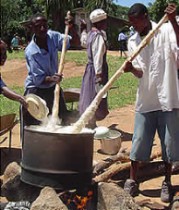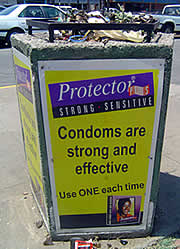Nice on the outside, but inside it’s rotten
Tuesday, October 31st, 2006 by Bev ClarkI’m keeping tabs on the anonymous advertisements about the Domestic Violence Bill being placed in the state-controlled press in Zimbabwe by opponents of the Bill. Yesterday, I saw this advert in The Herald
DOMESTIC VIOLENCE BILL “IGUYU”
KUNZE: very nice because it sells itself as fighting against wife battering and child rape.
Mukati masvosve
1. It promotes infidelity by refusing husbands the right to confront nor to reprimand even the most wayward wife.
2. It promotes sex before marriage and AIDS by fighting against virginity testing.
3. It allows for the destruction of clans by opposing appeasements of avenging spirits (Ngozi).
4. It puts rape and the most minor dispute at par and in the hands of police and the courts.
5. It deliberately ignores the cause of domestic violence.
6. It does not condemn n’angas who recommend child rape as “prescription” for AIDS and riches.
7. It introduces NGOs as the new extension of families by appointing them counselors and complainant’s representative replacing relative and elders.
8. It undermines the capacity and dignity of adult women by bringing in complainant’s representative without their consent.
9. It was made in Europe for Africans.
10. Only NGOs were consulted and are familiar with its contents as opposed to ordinary Zimbabweans.
11. It out dates the Bible (1 Timothy 2 vs 11-13 and Mathew 18 vs 15-17)
“Iguyu – refers to something that looks nice on the outside, but inside it’s rotten.
Engage The Editor of The Herald about these advertisements by writing to theherald@zimpapers.co.zw











